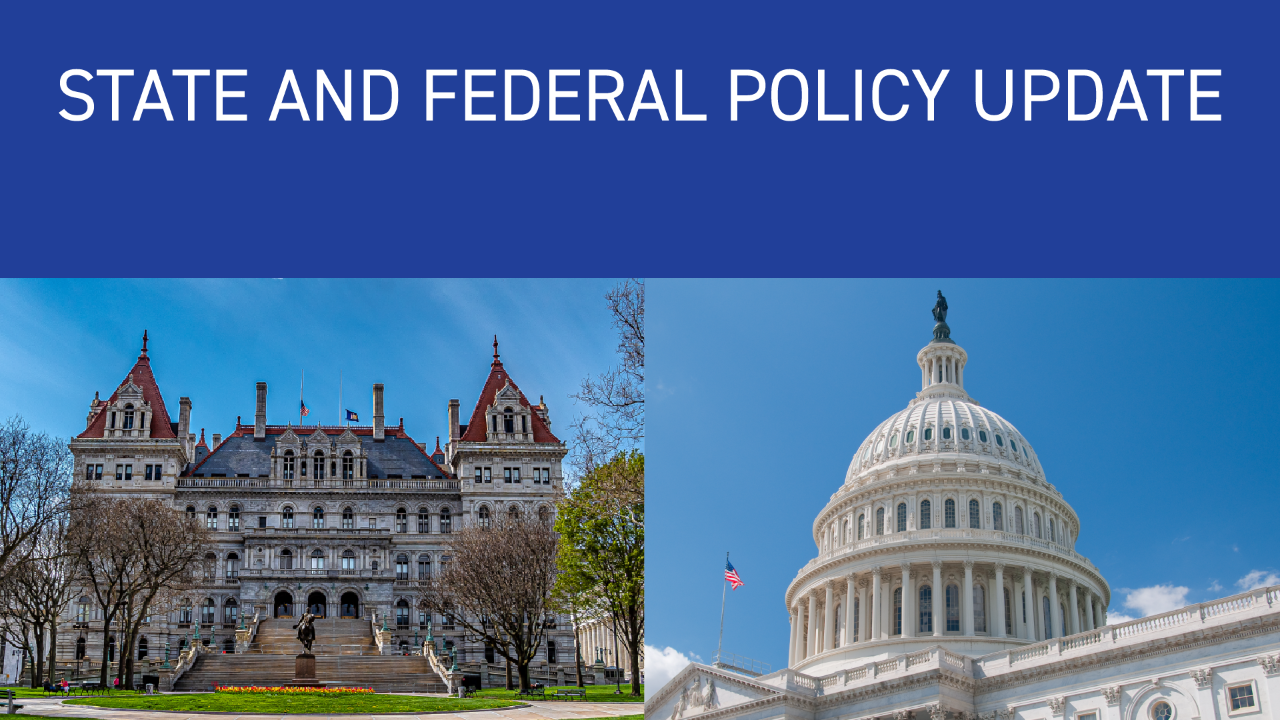State and Federal Update: November 10, 2025
Nov 10, 2025
Federal update
Deal to end federal government shutdown in sight
On Sunday night, the Senate voted 60-40 to limit debate on a bill that would reopen the federal government. Eight Democratic Senators crossed the aisle in support of the measure, which if passed would end the longest government shutdown in American history. The measure would fund the federal government through January 30, 2026, as well as provide a number of protections for federal workers: more than 4,000 workers laid off during the shutdown would be reinstated, with a restriction on any additional federal workforce cuts through January 30. Additionally, furloughed workers would see their back pay guaranteed.
The measure also would include three of the twelve appropriations bills that comprise the annual federal budget for Fiscal Year 2026: the Department of Agriculture (including full funding for the Supplemental Nutrition Assistance Program), Legislative Branch (covering pay for Congressional staff and Capitol police), and Military Construction/Veterans Affairs (funding for veterans’ services). While these agencies would have their funding level set through the end of the fiscal year (September 30, 2026), the other nine bills—including Labor/HHS/Education, which funds WIOA and related programs—would remain to be negotiated beyond January 30.
The bill does not include the key demand of Democrats who had opposed a deal: extension of subsidies for Americans who have healthcare through the Affordable Care Act. Under the deal, the Senate will take a vote on extending subsidies. But it is likely to fall short there, and all but certain to fail in the Republican-majority House. For this reason, most Democrats in both houses of Congress have stated their opposition to the deal.
With the White House in support of the agreement, it is very likely to pass, and as of Monday evening the Senate was working to move the bill quickly. What this might mean for Labor/HHS/Education and other bills—whether they too will be funded at near 2024 levels and pass with bipartisan support—remains to be seen. As always, NYATEP is closely monitoring events and will share updates as we receive them.
State update
Democrats win mayoralties across NYS; Mamdani takes control in NYC
Last Tuesday’s elections saw Democrats extend their leadership in a number of New York’s largest cities. Buffalo elected state senator Sean Ryan as mayor, while Sharon Owens won the Syracuse mayoralty, becoming that city’s first Black leader and second woman elected to the office. Albany elected chief city auditor Dorcey Applyrs, who becomes the first Black mayor of New York’s capital city—and just the fifth Albany mayor in the last 80 years.
In the state’s highest profile race, Assembly Member Zohran Mamdani completed a stunning political rise to defeat former governor Andrew Cuomo for the New York City mayoralty. A 34 year-old Democratic Socialist who began the race at the bottom of the polls, Mamdani emerged as a gifted political communicator whose message of activist government and emphasis on affordability resonated with voters, as the election saw the highest turnout for a mayoral race in decades. In the end, Mamdani overcame attacks on his youth, inexperience, and perceived far-left policies launched by Cuomo, whose attempt at a political comeback after resigning the governorship in disgrace four years ago fell far short of victory.
Since the election, Mayor-elect Mamdani has moved quickly to fill key roles and set a direction for his administration. Today, he named Dean Fuleihan, a veteran of Mayor Bill de Blasio’s administration, as his first deputy mayor. Last week, he announced the leaders of his transition team, including Maria Torres-Springer, former first deputy mayor under Eric Adams, and United Way of New York City President and CEO Grace Bonilla.
All are well-known and well-regarded veteran public servants. From a workforce development perspective, the appointments of Torres-Springer and Bonilla are particularly welcome, as both have high-level experience overseeing agencies that offer job training and employment services.
Logically, workforce issues should be at the forefront of the incoming administration’s agenda: the flip side of affordability is earning power, and workforce programs offer vast potential to help countless NYC residents achieve higher wages and greater economic security. Yet, as noted by the NYC Employment and Training Coalition, the Mamdani transition website does not list Workforce Development as an option on its resume submission form—suggesting the field still has work to do in making the case for the importance of our efforts.
NYATEP will continue to monitor events as they unfold and share details to our members as soon as possible. If you have an immediate questions or concerns, please contact David Fischer, Interim Executive Director, at dfischer@nyatep.org.

